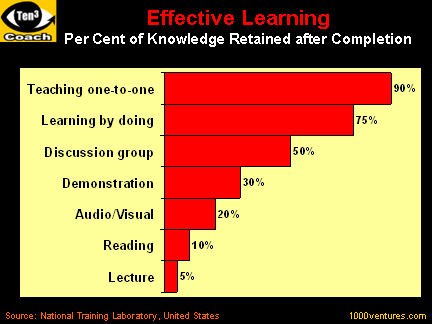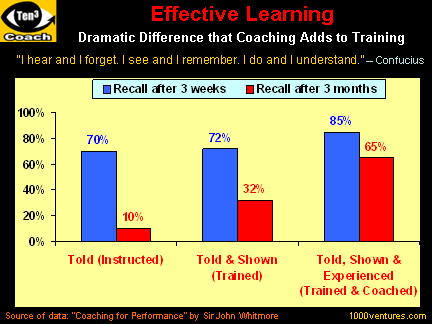

|
Learning by Doing
"I hear and I forget. I see and I remember.
I do and I understand." ~
Confucius
"I'm
always doing that which I can not do, in order that I may learn how to do it
."
–
Pablo Picasso
Education brings knowledge, applying it brings
wisdom.
You
learn from experience.
"The richest seam for learning is the
real opportunities, issues, difficulties and successes that people have.
There is no need to separate learning and doing."3 The didactic
approach - first you learn and then you do it - and didactic training which
companies spend their money on makes little difference if it not combined
with
real time development, i.e. bringing about learning and change at the
same time - not separating the two. "Most people learn far more from working
with their own reality, the 'here and now' and how they want to change this,
although it can be very challenging. In comparison, the didactic approach is
comfortable and, because of the lack of challenge it is relatively boring
and tends to be fundamentally disempowering."3
You learn from taking action, from your
failures, from
feedback, from getting going. As Alfred P. Sloan, the man who made General
Motors the largest and most successful and profitable
industrial enterprise in the world, puts
it: "Life itself is a process of trial and error... And those people who
make no mistakes are those who make nothing."
Interactive Learning
The mutual
exchange of tacit and explicit knowledge describes the knowledge creation
process. During the socialization mode of learning10,
tacit knowledge is transferred through
interactions between individuals, which may also be accomplished in the
absence of language. You may learn and gain a sense of competence by
observing behavior modeled by others. For example,
coaching,
mentoring and apprenticeships instruct tacitly through observation,
imitation, and practice...
More
The Power of Simplicity
Simplicity helps
people
work smarter
and faster. Simplicity works because it is based on common sense and makes
things easy to understand and do. Our human nature welcomes simplicity
and hates complexity.
In learning, we want things fast, but we don't
have time to study. Simple ideas from people who have done simple things and
achieved great results make this high-speed race more manageable. They
enable you to get started in small, immediate ways that make a difference,
confident that you will make progress if you take the initiative to act.4
Failure as a Learning Opportunity
Failure
provides a great learning opportunity and should be viewed as a very
lifeblood of success. "Although most people hate to be labeled a failure and
love to be labeled a
success, it is only through seeming failure that most of life's greatest
successes are achieved. Usually, "failure" or "success" is almost entirely
in the eye of the beholder... Failure is very often a misperception about
the difference between what exists and goes unnoticed (such as growth and
learning when we fall short of reaching a goal) and what is realized later
(longer term success)," writes Charles C. Manz, the author of The Power
of Failure.
►
Noble Failure
►
Freedom To Fail
Learn from Feedback
To make good use of
feedback, take notice of it in all its forms.
Put all feedback in a curiosity frame: ask yourself how you can use it to
avoid
failures, or to repeat
successes...
More
Attending Seminars
Explicit
knowledge may be exchanged during meetings or conferences in which a
diversity of knowledge sources combine to shape a new and enhanced
conception. Look for
learning opportunities and attend as many seminars as you can. You can often
save yourself hundreds of hours of reading and researching by attending a
seminar given by an authority in his or her field. You can learn ideas,
techniques and methods that can save you hours, days, even months of hard
work and research on your own.7
Make Notes
When you learn something interesting, make
notes. Even if an idea doesn't work today, you'll have record of it so you
can refer back to it sometime in the future. "Genius" doesn't just happen –
you need to look for
opportunities to learn, and keep track of your ideas.
Your best ideas will frequently be sparked by new information, new
attitudes, or new approaches to old information.
Memorizing
Everybody is
different, and there are probably hundreds of different study and
memorization techniques; the trick is finding the ones that work.
Brown and Miller12 list some of them...
More
Memorizing through
Reviewing
Short reviews will help
you retain the lecture information. With no reviews, you virtually have
to re-learn the material after about a month...
More
|